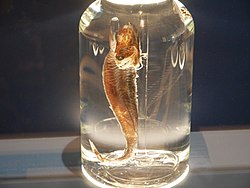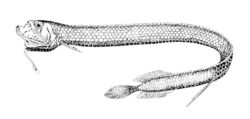Biology:Stomias boa
| Stomias boa | |
|---|---|

| |
| Preserved Specimen | |
| Scientific classification | |
| Domain: | Eukaryota |
| Kingdom: | Animalia |
| Phylum: | Chordata |
| Class: | Actinopterygii |
| Order: | Stomiiformes |
| Family: | Stomiidae |
| Genus: | Stomias |
| Species: | S. boa
|
| Binomial name | |
| Stomias boa (Risso, 1810)
| |
| Synonyms[2] | |
| |

Stomias boa, also known as the boa dragonfish, scaly dragonfish, dragon-boa or boa scaly dragonfish, is a species of deep-sea fish in the family Stomiidae.[4][5][6][3][7]
Three subspecies were previously recognised:
- Stomias boa boa (A. Risso, 1810)
- Stomias boa colubrinus (Garman, 1899)
- Stomias boa ferox (J. C. H. Reinhardt, 1842)
These and two others have been elevated to species.[8]
- Stomias boa boa (Risso, 1810) is now Stomias boa (Risso, 1810)
- Stomias boa colubrinus Garman, 1899 is now Stomias colubrinus Garman, 1899
- Stomias boa danae Ege, 1933 is now Stomias danae Ege, 1933
- Stomias boa ferox Reinhardt, 1842 is now Stomias ferox Reinhardt, 1842
- Stomias boa gracilis Garman, 1899 is now Stomias gracilis Garman, 1899
Description
Stomias boa has an elongated body and small head;[9] it is up to 32.2 cm (1.06 ft) in length, black underneath and iridescent silver on its flanks, with a barbel that has a pale stem, dark spot at base of bulb and three blackish filaments.[10][11] It has six rows of hexagonal areas above a lateral series of large photophores.[12] The dorsal and anal fins are opposite each other, just anterior to the caudal fin.[13]
Distribution and habitat
Stomias boa is mesopelagic and bathypelagic, living at depths of 200–2,173 m (656–7,129 ft) in seas worldwide, particularly off the Atlantic coast of North America, in the Mediterranean and in a band 20°–45° S.[14][15][16] S. boa ferox is concentrated in the North Atlantic.[17] S. boa colubrinus is most common off the Congo coast and the northwest coast of South America.[18][19]
Diet
Stomias boa eats midwater fishes and crustaceans; it rises to near the surface to feed at night.[11]
Reproduction
Stomias boa is oviparous; its larvae are 9–44 mm (0.35–1.73 in) in length.[20]
References
- ↑ Harold, Anthony (May 22, 2013). "IUCN Red List of Threatened Species: Stomias boa". IUCN Red List of Threatened Species. https://www.iucnredlist.org/en.
- ↑ "WoRMS - World Register of Marine Species - Stomias boa (Risso, 1810)". http://www.marinespecies.org/aphia.php?p=taxdetails&id=127374.
- ↑ 3.0 3.1 Coad, Brian W.; Reist, James D. (January 1, 2018). Marine Fishes of Arctic Canada. University of Toronto Press. ISBN 9781442647107. https://books.google.com/books?id=cu9ADwAAQBAJ&dq=%22Stomias+boa%22&pg=PA313.
- ↑ "Boa Scaly Dragonfish, Stomias boa (Risso, 1810)". https://australian.museum/learn/animals/fishes/boa-scaly-dragonfish-stomias-boa/.
- ↑ Institution, Smithsonian (November 3, 1895). "Smithsonian Contributions to Knowledge". Smithsonian Institution. https://books.google.com/books?id=oYebtmXEsvIC&dq=%22Stomias+boa%22&pg=PA108.
- ↑ Günther, Albert C. L. G. (November 3, 1864). "Catalogue of the Fishes in the British Museum: V". order of the Trustees. https://books.google.com/books?id=xos-AAAAcAAJ&dq=%22Stomias+boa%22&pg=PA426.
- ↑ Nations, Food and Agriculture Organization of the United (August 1, 2020). Identification guide to the mesopelagic fishes of the central and south east Atlantic Ocean. Food & Agriculture Org.. ISBN 9789251330944. https://books.google.com/books?id=gzz8DwAAQBAJ&dq=%22Stomias+boa%22&pg=PA127.
- ↑ "Stomias boa (Risso, 1810)". WoRMS. World Register of Marine Species. http://www.marinespecies.org/aphia.php?p=taxdetails&id=127374.
- ↑ Heessen, Henk J. L.; Daan, Niels; Ellis, Jim R. (September 1, 2015). Fish atlas of the Celtic Sea, North Sea, and Baltic Sea: Based on international research-vessel surveys. Wageningen Academic Publishers. ISBN 9789086868780. https://books.google.com/books?id=nBTTDwAAQBAJ&dq=%22Stomias+boa%22&pg=PA171.
- ↑ "Marine Species Identification Portal : Stomias boa". http://species-identification.org/species.php?species_group=fnam&id=1371.
- ↑ 11.0 11.1 "Stomias boa, Boa dragonfish". https://www.fishbase.se/summary/Stomias-boa.html.
- ↑ "Stomias boa | NBN Atlas". https://species.nbnatlas.org/species/NHMSYS0020703674.
- ↑ "Stomias boa". https://fishesofaustralia.net.au/home/species/4437.
- ↑ "Zoologica". New York Zoological Society. November 3, 1928. https://books.google.com/books?id=2x8fAQAAMAAJ&q=%22Stomias+boa%22.
- ↑ Smith, Margaret M.; Heemstra, Phillip C. (December 6, 2012). Smiths' Sea Fishes. Springer Science & Business Media. ISBN 9783642828584. https://books.google.com/books?id=FnTpCAAAQBAJ&dq=%22Stomias+boa%22&pg=PA230.
- ↑ "Stomias boa boa". https://www.gbif.org/species/7193804.
- ↑ "Stomias boa ferox Reinhardt, 1842". https://www.gbif.org/species/6169542.
- ↑ "Stomias boa colubrinus Garman, 1899 - Ocean Biodiversity Information System". https://obis.org/taxon/293746.
- ↑ "WoRMS - World Register of Marine Species - Stomias boa colubrinus Garman, 1899". http://www.marinespecies.org/aphia.php?p=taxdetails&id=293746#distributions.
- ↑ "Collected Reprints". The Center. November 3, 1987. https://books.google.com/books?id=vTzxAAAAMAAJ&dq=%22Stomias+boa%22&pg=PT35.
Wikidata ☰ Q3427078 entry
 |




